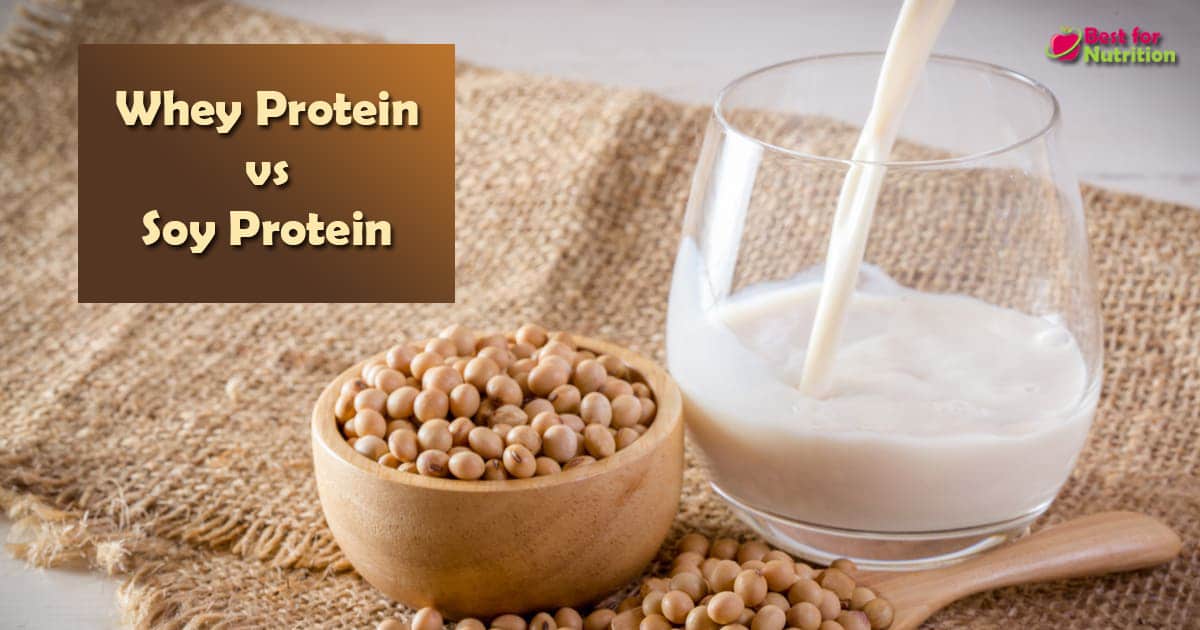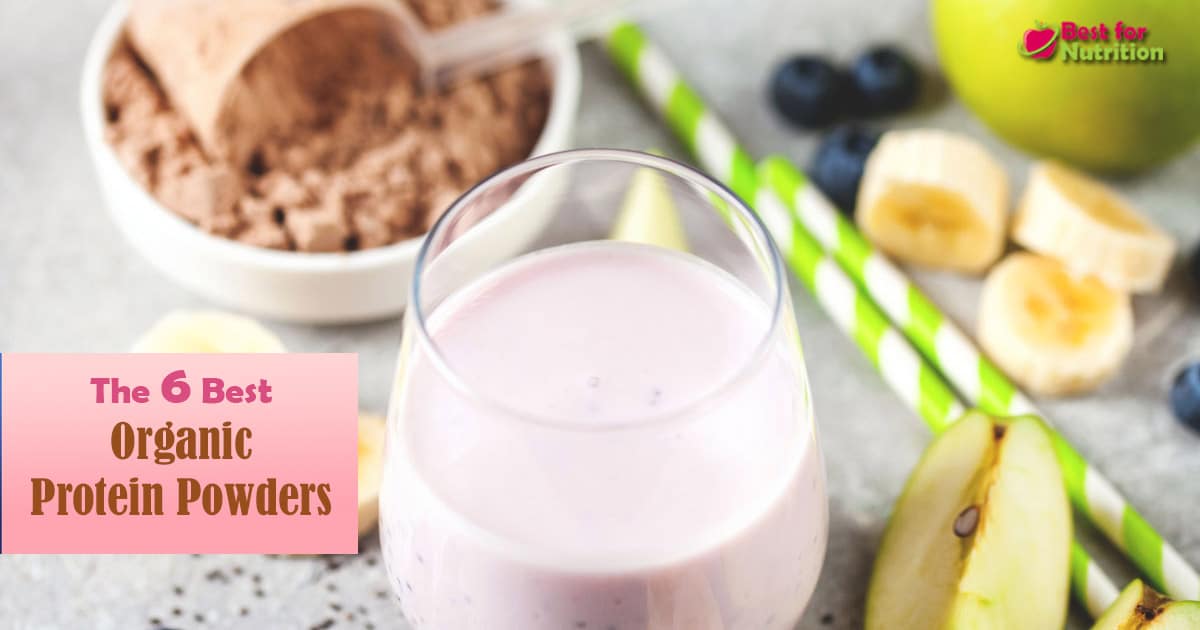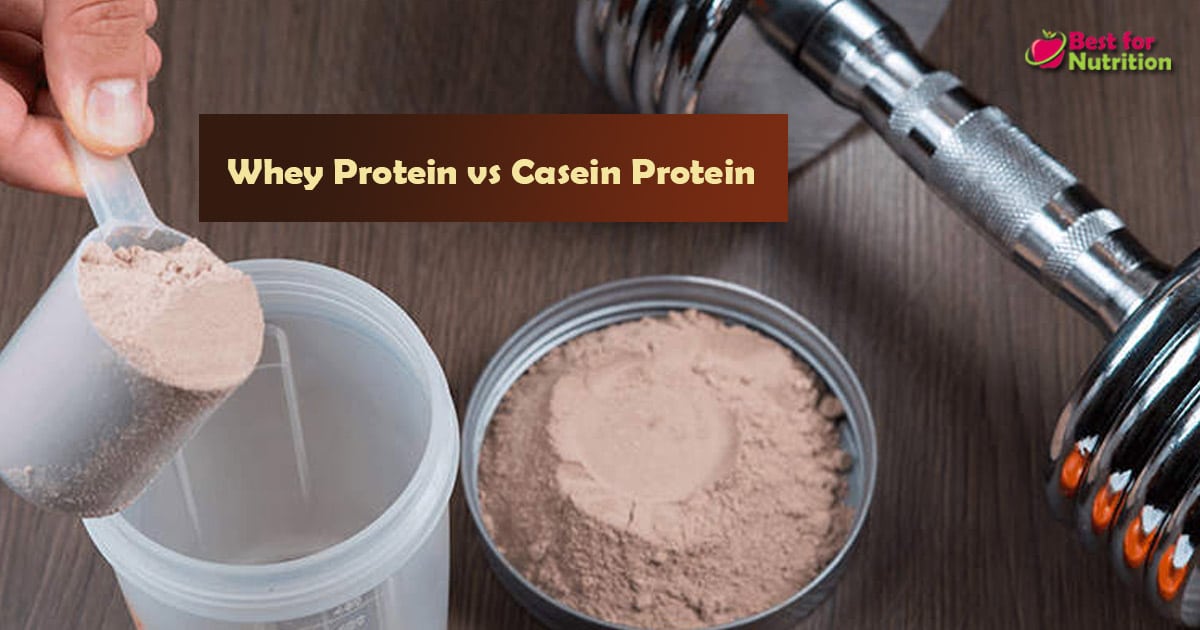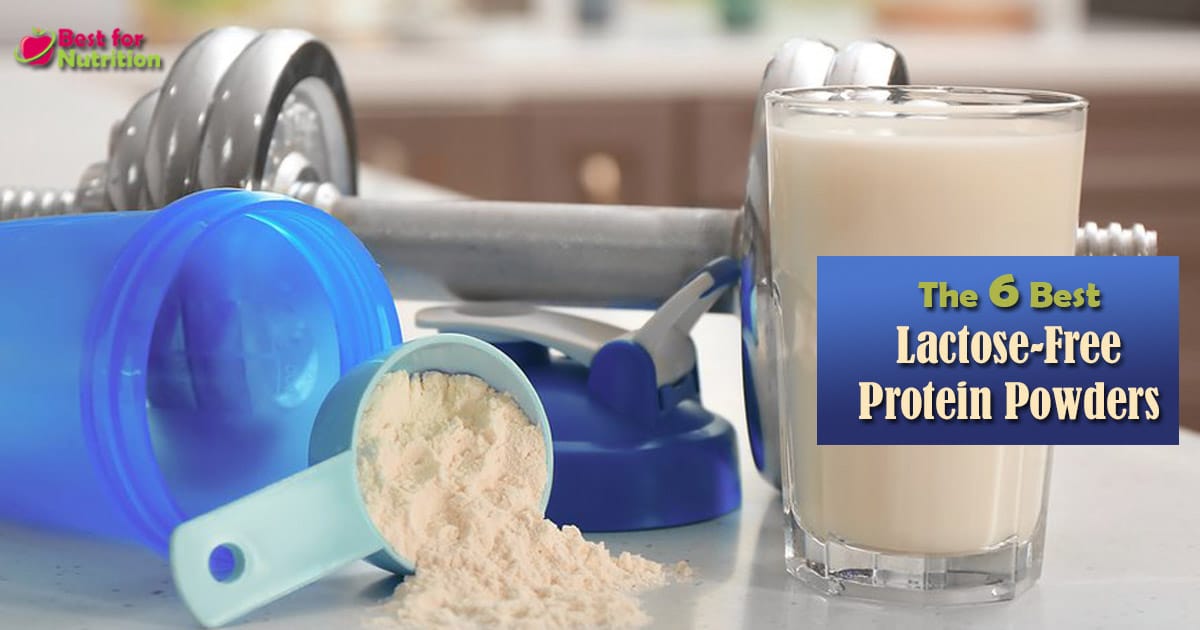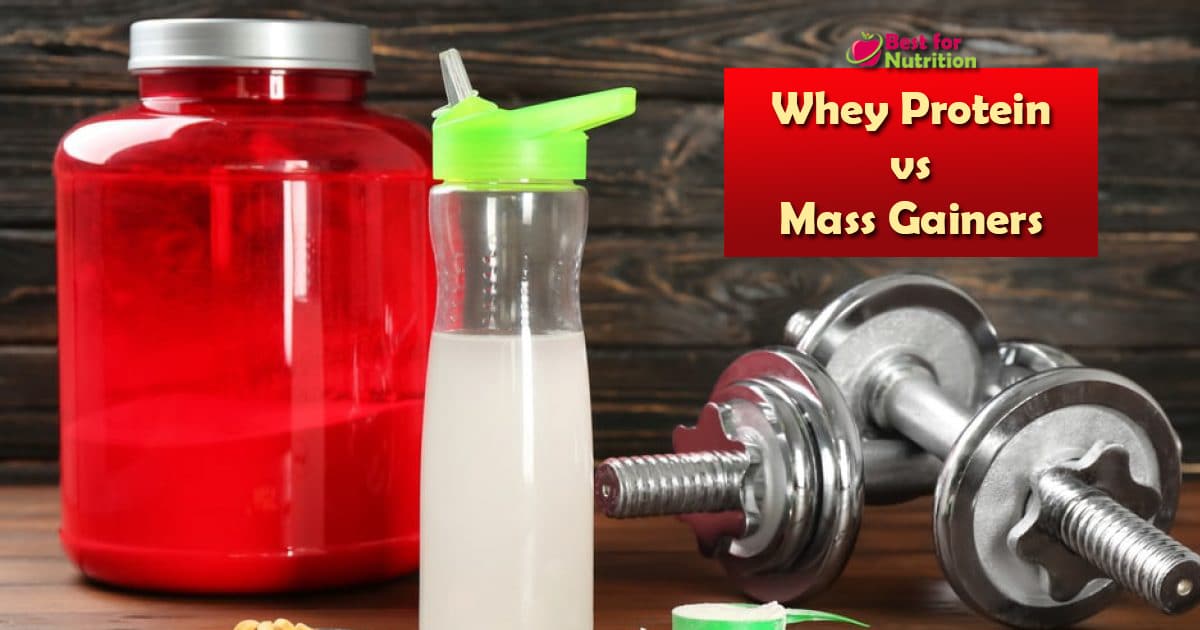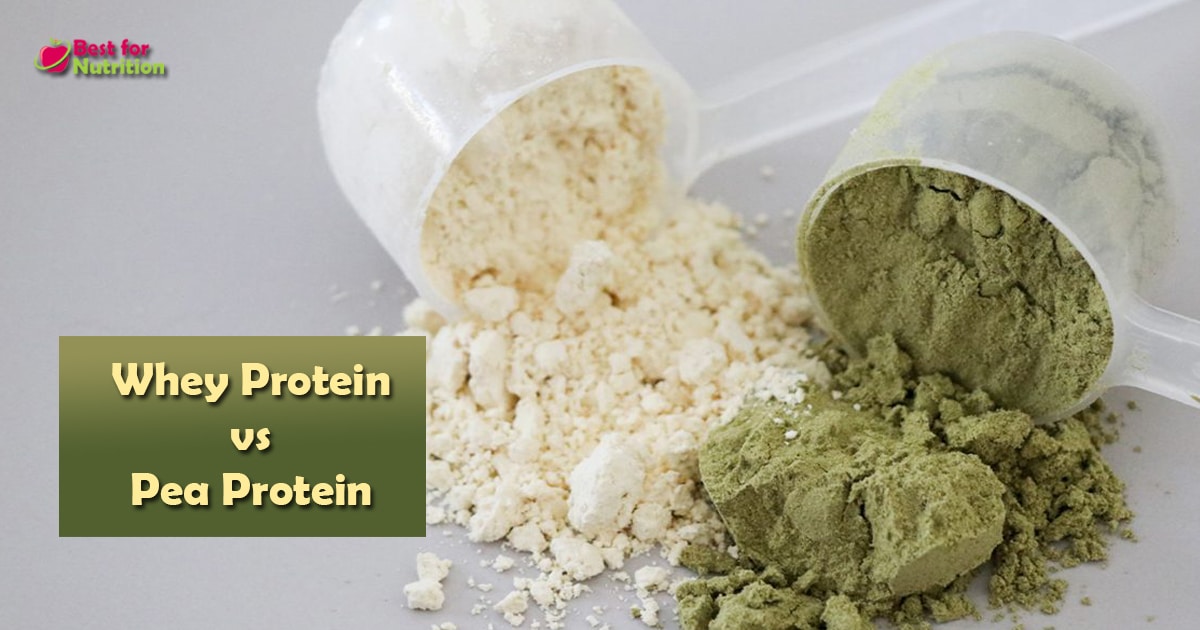Whey protein, with its incredible range of essential amino acids, is the number one supplement in the fitness industry.
It aids muscle protein synthesis, helps gain muscle strength, boosts your stamina, and makes you lose body fat. Whey is cheap, widely available, and one of the most studied supplements in the world.
However, more and more people are getting interested in plant-based protein because it is nutrient-dense, vegan friendly, and easier on the stomach, especially for those with lactose allergies
Let’s see who is the winner of this battle of plant-based protein powder vs whey protein powder! Can plant protein outshine whey?
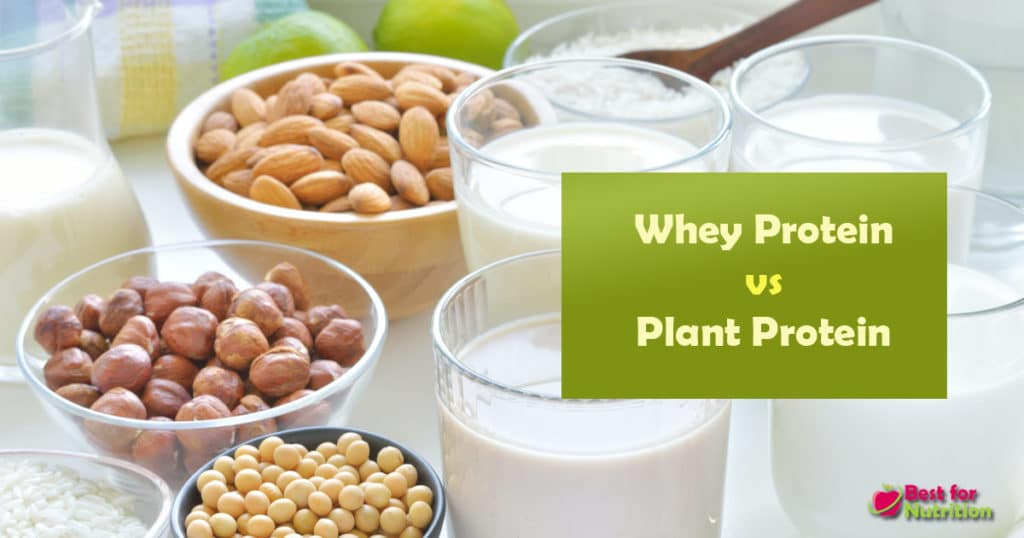
Whey Protein
Whey protein supplements are primarily made from milk. During the cheesemaking process, when the milk is curdled, the liquid that separates from curd is called the whey. It’s high in protein and contains some amount of lactose (milk sugar).
Amino acids are the building blocks of protein. Our body needs 20 amino acids and most of these can be synthesized by the body to meet its requirements (1). However, 9 of them can only be obtained from your diet. These are called the essential amino acids (2).
Whey protein is considered a complete protein as it contains all these 9 essential amino acids. Whey also has many other amino acids including the BCAAs (branched-chain amino acids), which play a major role in promoting muscle growth and post-exercise recovery (3).
Studies have confirmed that whey protein can help build muscle, assist the athletes with recovery after a heavy exercise, as well as, increase strength and power in response to strength training (4),(5),(6),(7).
Whey protein has been found to suppress appetite This is extremely beneficial for overweight people and helps improve their overall health (8),(9).
Whey protein can also reduce inflammation. A 2015 study found that whey protein in high dosage significantly reduces C-reactive protein (CRP), a key marker of inflammation in the body (10).
Summary: Whey protein is a high-quality protein with all the 9 essential amino acids that help increase muscle mass, strength, and aid in post-workout muscle recovery. They suppress appetite thus helping you cut down your calorie intake.
Plant Protein
Plant proteins are the protein that we get from plant sources such as rice, peas, soy, hemp, nuts, or sunflower seeds (11).
Plant-based proteins are lower in calories and fat in comparison to animal protein but higher in fiber and nutrients.
Several plant protein supplements have flooded the market. Some of them are listed below:
- Pea protein
- Hemp protein
- Pumpkin seed protein
- Brown rice protein
- Soy protein
- Sunflower seed Protein
- Sacha inchi protein
- Chia protein and more
Plant proteins do not contain optimal levels of all the essential amino acids. However, when taken as a combination of two or more, the complementary amino acids together combine to create a complete protein. One such combination is brown rice and pea protein (12).
In a 2013 study, researchers compared the effects of whey and rice protein supplementation on body composition and exercise performance. They noted that brown rice protein was as effective as whey protein when it came to muscle building, gaining strength, and supporting muscle recovery (13).
A 2015 study published in the Journal of the International Society of Sports Nutrition concluded that vegetable pea proteins are an equally good alternative to whey protein.
The researchers had compared the effect of pea protein and whey protein in terms of muscle strength and thickness in 160 healthy adult men (14). Many more studies have confirmed this observation (15), (16).
Summary: Plant proteins are often incomplete proteins as they may not contain all the 9 essential amino acids. However, when combined two together, they complement each other and are as good as whey.
Whey Protein vs Plant Protein
Both these proteins have their share of health benefits as well as limitations. Check them out and decide which one is better for you!
Calories
Normally plant protein is lower in calories than whey. 25 grams of plant protein will contain approximately 97 calories as compared to 120 calories in the same quantity of whey protein.
Amino Acid Profile
Whey protein has a complete amino acid profile with all the 9 essential amino acids that our body needs (17). However, plant-based proteins are deficient in one or the other. Taking a combination of plant proteins can solve this problem.
For example, brown rice and pea protein together are as nutritious as whey. Whey also contains cysteine, an amino acid which is the precursor of glutathione, a powerful detoxifier, and antioxidant. Plant proteins are deficient in cysteine (18).
Nutrient Density
Nutrient density refers to the number of nutrients that a food contains per calorie consumed. To maintain optimal health, endurance athletes need to consume foods that are dense in nutrients.
Even though high in protein, whey proteins lack any other nutrients. Plant sources on the other hand have more nutritional goodness in addition to the protein, such as calcium, iron, B-vitamins, omega-3-fatty acids, iodine, and many more (19).
Digestion and Health
Whey protein comes from milk. Therefore, it is not conducive for those who are lactose intolerant.
Both the allergy and intolerance to whey may produce various gastrointestinal problems such as bloating, pain, flatulence, and diarrhea (20).
Plant-based proteins are lactose-free and can be a great hypo-allergenic alternative (21). Plant-based proteins that are free of soy, nuts, and wheat are ideal for anyone who has digestive sensitivity.
Vegan Friendly
Plant-based proteins are totally vegan friendly, while whey protein is not as it is sourced from milk.
Taste
Plant-based proteins have lower amounts of artificial sweeteners as compared to whey proteins. Therefore, they are much more neutral in taste as compared to whey which comes in a lot many options ranging from chocolate strawberry to salted caramel delight.
Price
Whey protein is one of the cheapest protein powders in the market because of its mass production. In comparison, plant protein powders are a lot more expensive.
Additives
Whey protein powder often contains artificial sweeteners and additives. Choose wisely by carefully checking on the labels. Make sure the one you choose is low in sugar and carbohydrates, more importantly, if you are on a weight loss journey.
Do confirm that they don’t contain maltodextrin, acesulfame k, sucralose, and aspartame which have serious long-term health issues.
Comparatively, plant proteins have essential nutrients and vitamins that have good taste and do not need many additives. They contain much lower content of artificial sweeteners giving them a more neutral taste.
Summary: Whey proteins are complete proteins with the highest amount of BCAAs conducive for muscle synthesis. In comparison, plant proteins are incomplete proteins. Plant proteins are vegan-friendly, easy to digest, nutritionally dense, and low in additives.
Whey Protein vs Plant Protein: For Muscle Building
Leucine, isoleucine, and valine are the BCAAs that play a crucial role in muscle protein synthesis. Whey proteins are the highest source of BCAA. It also contains all the essential amino acids which help in building and repairing muscle tissue (22).
Plant proteins lack in this regard. Even though this issue may be corrected by combining two or more types of plant proteins, whey protein still emerges the winner as it contains 20-30% more BCAA.
Research suggests that 2-3 g of leucine stimulates muscle protein synthesis (23). Plant-based protein, even in combinations contains a lower amount of leucine, while that is not the case with whey.
Summary: When it comes to muscle protein synthesis, whey is more efficient than plant protein because it contains all the essential amino acids, It has about 20-30% more BCAA and these are especially important for muscle building.
Whey Protein vs Plant Protein: For Weight Loss
Studies have confirmed that a high consumption of whey protein reduces the level of ghrelin, a hormone that sends signals to the brain when you are hungry.
This makes you feel full and satiated for a longer period and you end up eating less. Whey protein supplementation can be ideal for a weight loss program (24),(25).
Plant protein, on the other hand, may not be as satiating, however, the calorie per serving of plant protein is very less. Thus plant protein sources are also a great addition to your diet if you are trying to lose weight.
Summary: Whey protein can help weight loss by reducing the level of ghrelin, the hunger-causing hormone. Plant proteins are low in calories and are thus a great addition to a weight loss diet plan.
Plant-Based Protein vs Whey: Which One to Choose?
Both whey and plant-based protein have their own share of pros and cons. Whey protein is considered to be the best protein supplement for bodybuilders and athletes. But due to lactose intolerance or their vegan lifestyles, many people look for other options.
Whether you take plant protein or whey protein, the goal is to optimize your workouts, which both forms will do. So depending on your food preferences, digestibility, and specific needs, you should choose the one which suits your needs the best.
Plant-based protein, also called vegan protein, comes from hemp, pea, rice, soy, seeds, and quinoa. Vegan proteins also offer essential vitamins and nutrients. They are easily digestible. They can help you overcome the digestive problems that are often associated with whey protein.
However, keep in mind that soy is the only complete vegan protein, and rest all plant proteins are deficient in one or more essential amino acids.
The amino acids are methionine, isoleucine, lysine, threonine, and tryptophan are the ones most frequently absent (26). So have a variety of these vegan proteins to ensure you get all the required amino acids.
Summary: Whey is believed to be the best but plant protein taken in combination is as good. Plant protein is vegan friendly and easily absorbed yet missing in one or more of the essential amino acids. The choice is ultimately yours on the basis of your preferences.
Frequently Asked Question (FAQs)
Is Plant-based Protein as Good as Whey Protein?
Plant-based protein is very good, but it is not necessarily better than whey. If you compare their amino acid profile gram for gram, whey still will be the top player in the market.
However, plant-based proteins are easier to digest, kind to the environment, gluten-free, offer essential nutrients, and a great choice for people who are lactose intolerant, and have digestive issues.
What Does Whey Protein Come From?
The watery part of milk that remains after curd formation is known as whey. This liquid is mostly a mixture of some protein, fat, and carbohydrate. Whey retains some amounts of the milk sugar, lactose.
The whey liquid is then processed and filtered to remove most of the fats and carbohydrates. What remains is the protein which is then dried and used to make whey protein powders (27).
What is the BCAA Content of Whey Protein vs Plant Protein?
Whey protein has the highest concentration of BCAAs in comparison to any other dietary source. It is up to 26g of BCAAs per 100g of protein.
In comparison, plant protein contains around 18-19% of BCAA, which may not be as good as whey but still considered a good amount (28).
The Final Note
Whey has been the undisputed king of fitness supplements for a long time because of its amino acid profile. It is the most widely used supplement for building muscle, strength, stamina, and boosting muscle recovery.
However, plant proteins are giving serious competition to whey and are becoming popular among consumers. They do not contain any milk-derived ingredients and tend to be free from common allergens. They are much easier on the stomach and lower in calories
Combining two or more plant proteins usually help to make them as effective as whey in increasing muscle thickness and lean body mass.
Therefore, whey protein is the ultimate supplement that helps you to perform at maximum intensity. However, if you are a vegan or lactose intolerant, or just looking for a non-dairy protein powder, research suggests that plant proteins can be a great option.
